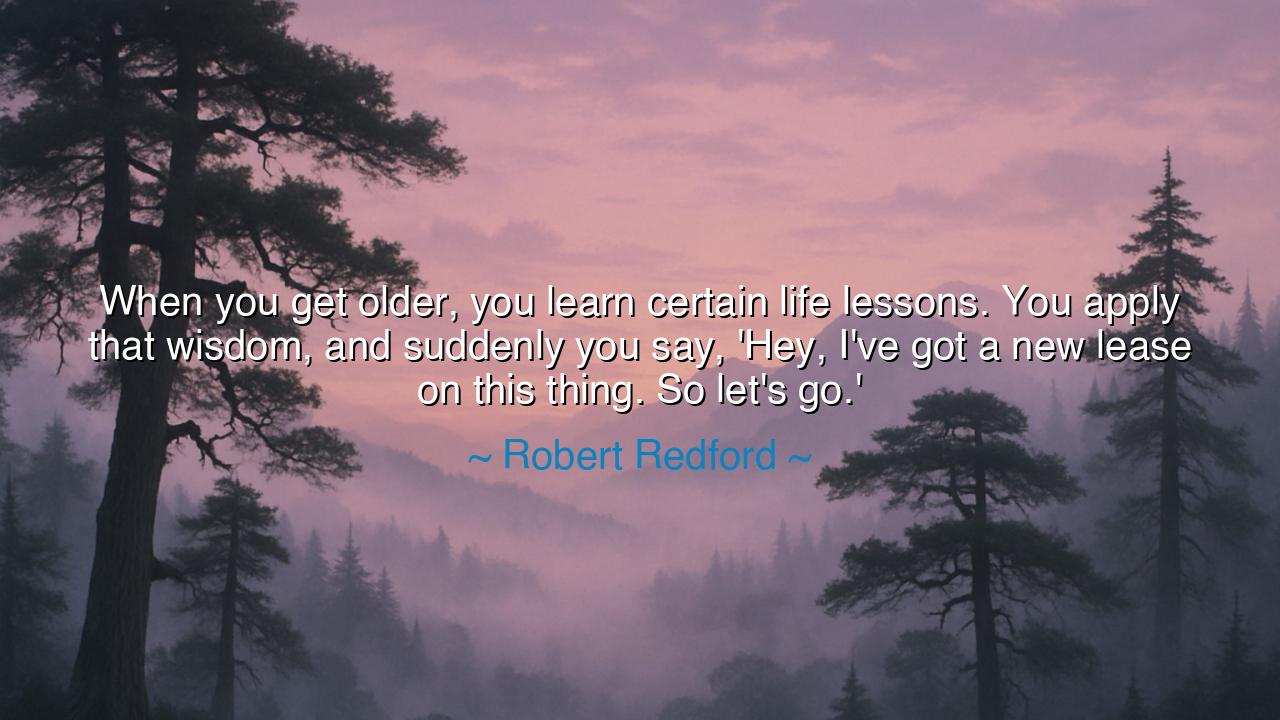
When you get older, you learn certain life lessons. You apply
When you get older, you learn certain life lessons. You apply that wisdom, and suddenly you say, 'Hey, I've got a new lease on this thing. So let's go.'






“When you get older, you learn certain life lessons. You apply that wisdom, and suddenly you say, 'Hey, I've got a new lease on this thing. So let's go.'” These words from Robert Redford carry a powerful reflection on the nature of growth and wisdom as we age. Redford speaks of the transformative power of time and experience — how the lessons we learn over the years can serve as a kind of rebirth, giving us a renewed sense of purpose and clarity. In youth, we are often driven by impulses and desires, but with age comes a deeper understanding of the world and of ourselves, leading to a profound shift in how we approach life.
The ancients recognized this transition as well. Plato, in his Republic, spoke of how the soul’s journey towards wisdom is a lifelong process, one that deepens with age. The older soul, having lived through the ups and downs of life, gains greater insight into what truly matters — not material wealth or fleeting pleasures, but the pursuit of inner peace and virtue. Redford's statement mirrors this ancient understanding: that wisdom is earned through experience, and with that wisdom comes a renewed energy, a new lease on life that encourages us to continue forward with purpose and resolve.
Aristotle, too, understood that wisdom comes with the maturation of both mind and spirit. As we age, we gain the ability to see the world with more balanced eyes, recognizing the transient nature of youth and the lasting value of virtue. In his work on ethics, Aristotle spoke of the importance of practical wisdom or phronesis, which develops over time. He believed that true wisdom was not an abstract concept, but a way of living — a way that is cultivated through experience and reflection. Redford echoes this idea in his own life, recognizing that with the wisdom gained through years of living, he is now able to approach life with a new sense of vigor.
Consider the story of Nelson Mandela, who, though imprisoned for nearly three decades, emerged from that suffering with a renewed sense of purpose and wisdom. His life offers an example of how life lessons learned over time can lead to a complete transformation in how we view the world. Mandela emerged from prison not with bitterness but with a vision for reconciliation and unity. He had gained a deeper understanding of human nature, and with that, he was able to offer a new lease on life — not just for himself, but for an entire nation. His ability to apply the wisdom gained through suffering and experience allowed him to lead with a vision that transcended personal hardship.
Redford’s reflection is a testament to the power of age and experience in shaping one’s path. It is a reminder that wisdom is not an instantaneous acquisition but a process that unfolds gradually over time. As we age, we accumulate lessons, and in doing so, we become better equipped to navigate the complexities of life. With wisdom comes the ability to embrace life’s challenges with a renewed sense of vigor — as Redford says, “Let’s go.” The wisdom of the ancients teaches us that it is never too late to continue our journey, to apply the lessons we have learned, and to move forward with greater understanding and strength.
Thus, let us remember that wisdom is not a static treasure, but a living, breathing force that grows with us, filling our hearts with the courage to live boldly, regardless of age. As we grow older, we gain the power to transform our experiences into something greater, just as Redford and Mandela have done in their lives. The wisdom of age is not something to be feared, but something to be embraced as we walk into the next phase of our journey.






TTNgo Le Tue Thu
This quote feels inspiring because it frames aging as an opportunity rather than a decline. But it also prompts reflection on whether society undervalues the wisdom of older individuals. If life experience leads to a renewed sense of purpose, why isn’t this perspective more widely celebrated? I’m also curious about how this applies to career, relationships, and personal goals. How do people translate the lessons they’ve learned into tangible action for a second phase of life?
SFStore Fashion
Redford’s quote makes me curious about the role of wisdom in motivating action. How much of this renewed enthusiasm is truly the result of life lessons, and how much is a conscious choice to embrace life differently? I also wonder if younger people can achieve a similar sense of clarity, or if it’s inherently tied to the perspective that comes with age. Is there a way to fast-track this kind of insight without waiting decades?
NTNgoc Tram
I love the optimism in this perspective, but it also raises questions about timing and opportunity. Does everyone get the chance to experience this newfound vitality, or is it dependent on certain circumstances and privileges? It also makes me think about how personal growth might accelerate after facing challenges or failures. Could the struggles themselves be what make this ‘new lease’ possible, or is it simply age and reflection that bring it about?
MKMinh Khoi
This quote really resonates with me because it suggests that aging isn’t just about getting older—it’s about accumulating experiences that give you a clearer perspective on life. I wonder, though, how often people actually recognize these lessons and seize that ‘new lease’ moment. Are some people too caught up in regrets or routine to feel this sense of rejuvenation? How can one cultivate the awareness needed to reach that turning point?